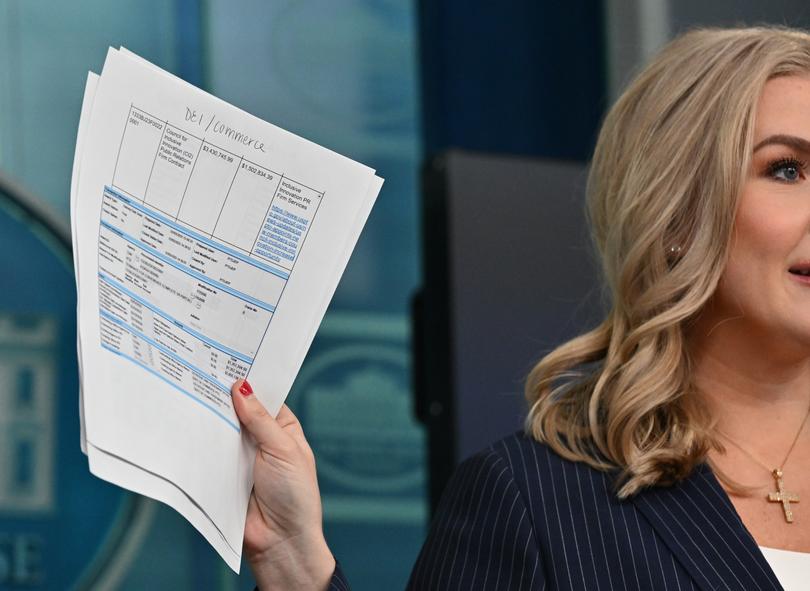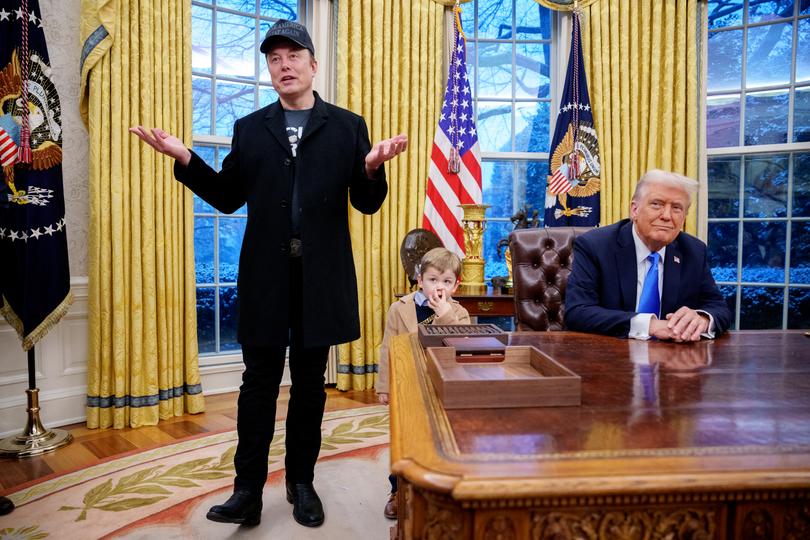THE WASHINGTON POST: Move fast, break things, rebuild - Elon Musk’s strategy for US government
THE WASHINGTON POST: Though the slogan ‘Move fast and break things’ was coined (and later abandoned) by Facebook founder Mark Zuckerberg, it has found no clearer avatar than Elon Musk.

U.S. DOGE Service personnel come in hot. Striding into federal departments in casual clothes and moppy haircuts, they demand access to employment and funding databases.
Federal workers who refuse can find themselves on a tense phone call with DOGE head Elon Musk or one of his senior aides.
Once DOGE crews gain access to IT systems, they use tech tools to quickly identify programs to cut and people to fire. In some cases, they have used artificial intelligence software to comb through federal databases for targets.
Sign up to The Nightly's newsletters.
Get the first look at the digital newspaper, curated daily stories and breaking headlines delivered to your inbox.
By continuing you agree to our Terms and Privacy Policy.This account of the Department of Government Efficiency’s cut-first-ask-questions-later approach is based on meeting records obtained by The Washington Post and conversations with eight people familiar with the group’s work or Musk’s goals and philosophy.
All spoke on the condition of anonymity to avoid retaliation or to discuss private information.
A month into Musk’s explosive campaign inside the federal government, DOGE claims to have achieved $55 billion in savings by cutting government contracts. But a Washington Post analysis found that hundreds of the cancelled contracts listed represent savings of $0 each and that the interventions have had disruptive consequences.
Millions of pounds of food aid are stranded en route to overseas recipients after DOGE swept through the U.S. Agency for International Development, The Post reported Friday, despite a court order requiring foreign aid to be restarted. The Agriculture Department said last week that it was trying to rehire several people fired in DOGE-directed cuts who were working on the ongoing outbreak of avian influenza, or bird flu.
But DOGE’s actions reflect management practices that embrace upheaval and have cemented Musk’s reputation in Silicon Valley as a visionary leader. Though the slogan “Move fast and break things” was coined (and later abandoned) by Facebook founder Mark Zuckerberg, it has found no clearer avatar than Musk.
“You should just cut,” one of the people said of Musk’s philosophy, speaking on the condition of anonymity to describe private conversations. “Then, if it breaks, you can just add things back in.”
People familiar with the billionaire’s leadership style say he likes to slash frameworks he considers broken and rebuild them from scratch, even if that could sow confusion and dysfunction. That approach has similarities with zero-based budgeting, or ZBB, a strategy once embraced by President Jimmy Carter.

But the speed at which Musk implements his vision, such as during his 2022 acquisition of the social network Twitter, now called X, often guarantees turmoil. After Musk fired about 80 percent of Twitter’s workforce, including many content moderation staff, and loosened content rules, the platform suffered technical outages and saw a surge in antisemitic posts.
The consequences of that delete-and-rebuild-from-zero approach can be more drastic when applied to government departments that provide services many people rely on. Cybersecurity experts have also raised concerns about the potential for hacks and leaks when government databases are copied, combined or made accessible to many more people.
Some DOGE representatives used personal laptops when they initially came to one agency, said a person familiar with the situation who spoke on the condition of anonymity to avoid retribution. Using personal devices can breach agency security policies.
“Move fast and break stuff, that’s great in software as a service,” said John Gilmore, head of research at cybersecurity company DeleteMe. “That gets really complex when you start talking about the government, because the government has an agreement with citizens.”
Some citizens are questioning the methods employed by DOGE and Musk. Republican lawmakers faced anger and protests last week from constituents about federal layoffs and DOGE’s access to personal data.
A Washington Post-Ipsos poll found that 49 percent of Americans said they disapprove of the way Musk is handling his government job, with 34 percent approving and 14 percent not sure.
A spokesperson for the White House, where DOGE has been referring questions, did not respond to a request for comment.
President Donald Trump on Saturday said in a post on Truth Social that he was happy with Musk’s work. “ELON IS DOING A GREAT JOB, BUT I WOULD LIKE TO SEE HIM GET MORE AGGRESSIVE,” he wrote.
Hours later, Musk posted on X that all federal employees would shortly receive an email asking “what they got done last week” and that any who failed to reply would lose their job. Musk previously posed a version of that question to Twitter’s CEO ahead of his acquisition of the company, and later fired him.
Federal workers began receiving emails from the Office of Personnel Management on Saturday afternoon with the heading “What did you do last week?,” according to a copy reviewed by The Post. It asked recipients to reply with a summary of their accomplishments before Monday at 11:59 p.m. Eastern time but did not mention consequences for not responding.
Confusion followed as leaders at several agencies, including the Defense Department, told workers not to reply, while Musk said in a post on X on Monday that anyone who didn’t take the email seriously would “soon be furthering their career elsewhere.”
‘Get to the core’
Since the conception of DOGE in the fall, Musk has been focused on using technology to gain access to the infrastructure of the federal government and using data-mining tools to search for inefficiency, waste and programs contrary to Trump’s agenda, said two people familiar with the planning process among Musk associates. They spoke on the condition of anonymity to describe it.
In discussions about how the group should operate, Musk said that it was important to gain direct and immediate access to government data and systems, to allow swift deletion of programs without the need for broader consensus or input from untrustworthy bureaucrats, the two people said.
“If you accept for a moment that people are trying to hide lots of things, then that’s how you get at it,” the person said. “You get to the core.”
The people Musk hired to implement that vision are generally young, often in their 20s, and typically have backgrounds in technology rather than government.
They work long hours, through weekends and at breakneck speed, said two federal employees who have worked directly with the group and who spoke on the condition of anonymity for fear of retaliation.
DOGE staffer Christopher Stanley, who has worked in security engineering at Musk’s companies, boasted about leaving work at 2:03 a.m. Friday morning.
“Just now leaving work. Caring and Competence,” he wrote on X, with an emoji featuring two hands clasped in the shape of a heart. Stanley did not respond to a request for comment.
“Exactly,” Musk affirmed at 2:36 a.m. He has said DOGE is working 120 hours a week, evoking times when he has become hyper-focused on challenges at one of his businesses and has spoken of sleeping at the offices of Twitter or a Tesla factory.
DOGE representatives have displayed contempt for civil servants, suggesting they consider them to be stupid or slow, the two federal employees said. Musk suggested in a post on X last month that government workers have been “pretending to work while taking money from taxpayers.”
DOGE staffers are under immense pressure to move as fast as possible, the federal employees said. One source of that is Steve Davis, a Musk deputy who previously helped him revamp Twitter, who constantly pushes DOGE staffers, and any federal worker who gets in the way, to go faster, the employees said. Davis did not respond to a request for comment.
In early February, DOGE representatives showed up at the FBI and asked staff to combine the agency’s various employee databases to make them more easily navigable. FBI workers pushed back, saying the data was in separate databases managed by dozens of staff and couldn’t be combined overnight.
The DOGE representatives insisted that the task could and should be done by just a handful of people, said a person with knowledge of the situation at the FBI, who spoke on the condition of anonymity to avoid retribution for sharing details about the group’s work.

The response betrayed a lack of understanding of how government databases work and the realities of working with outdated technology, the person said.
One reason DOGE agents have pushed career staff to centralise federal data is to “optimise” it and make it searchable, including with AI tools. That can speed up the process of identifying programs to cut.
At the Agriculture Department, a senior official told staff that an AI bot would be searching databases to hunt for spending that ran afoul of Trump’s executive order forbidding diversity, equity and inclusion programs, according to contemporaneous meeting records obtained by The Post.
That marked a reversal from the pre-DOGE era. Staff had previously raised alarms about the use of AI, resulting in a ban on ChatGPT use on USDA computers and the rejection of a proposed subscription to proofreading tool Grammarly, according to a department employee who spoke on the condition of anonymity to avoid retaliation.
DOGE staff have also adapted government AI tools built under the previous administration to their fast-moving mission.
President Joe Biden issued an executive order on AI in 2023 that ordered government agencies to find ways to use AI more while adhering to guardrails meant to protect civil rights.
Many government workers familiar with those tools and initiatives have been fired in the general purge of probationary federal workers instigated by DOGE, according to two people familiar with the situation who spoke on the condition of anonymity to avoid retribution.
At the General Services Administration, Musk’s allies want to turn an existing tool called GSAi into a more general-purpose system that can go “full-blast ASAP,” one of the people said.
Biden’s AI initiative had some overlap with Musk’s vision for DOGE, urging government departments to embrace the technology.
“The Musk people are not interested in guardrails, is the big difference,” the person said.
© 2025 , The Washington Post
